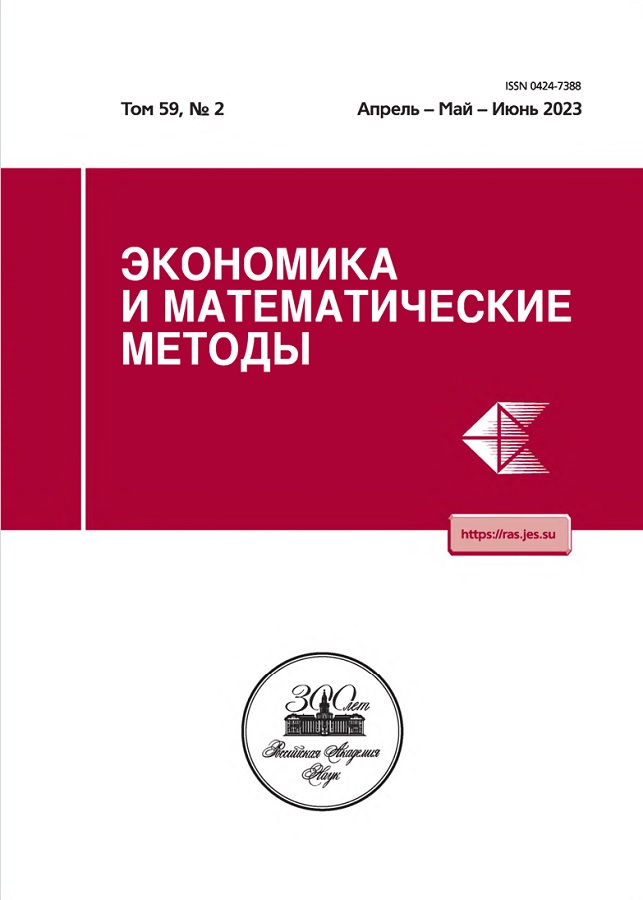Modeling the socio-economic development of Russia using big data and data from field experiments
- 作者: Usmanov D.I.1, Dudin M.N.2
-
隶属关系:
- Federal government budgetary institution of science Market economy institute of RAS
- Market Economy Institute of RAS
- 期: 卷 59, 编号 2 (2023)
- 页面: 39-53
- 栏目: Articles
- URL: https://archivog.com/0424-7388/article/view/653340
- DOI: https://doi.org/10.31857/S042473880023483-0
- ID: 653340
如何引用文章
详细
The purpose of the article is to study the prospects of socio-economic development of Russia from the point of view of transition to economic autarky. The study includes a cluster analysis of trends and patterns of socio-economic development of Russia, as well as neighboring countries (CIS). As a comparison base, data were used on countries that have passed (South Korea and Japan) or are passing (Iran) through a full-scale experiment of economic autarky with varying degrees of success. Statistically processed big data reflected in the Countries' Prosperity Index (Legatum Prosperity Index) by the end of 2021 were used as the information base of the study. The study also conducted a simulation of the socio-economic development of Russia, taking into account the accumulated potential, based on a taxonomic method related to the group of economic and mathematical methods of decision-making on a set of attributes (Multiple Attribute Decision Making, MADM). The results of the study show that Russia does not have the necessary development potential to switch to successful models of economic autarky, which were implemented in South Korea and Japan at the time. Russia is capable of further implementing an inertial model of socio-economic development, and is also capable of transitioning to an economic autarky of the Iranian type. The same conclusion applies equally to the countries of the near abroad (CIS). The results obtained can be used as an information base for decision-making in the field of public administration and regulation of socio-economic and socio-political processes.
作者简介
Daler Usmanov
Federal government budgetary institution of science Market economy institute of RASMoscow, Russia, 117418 47, Nakhimovsky prospect
Mikhail Dudin
Market Economy Institute of RASMoscow, Russia, 117418 47, Nakhimovsky prospect
参考
- Ильюхов А. А. (2015). Вынужденная автаркия: исторический опыт // Russian Journal of Economics and Law. № 1 (33). С. 26-31.
- Клейнер Г. Б. (2022). Инклюзивный рост в экономике замкнутого цикла // Экономическое возрождение России. №. 3 (73). С. 37-44.
- Ларин С. Н., Соколов Н. А. (2021). Анализ влияния санкционных ограничений на экономики Ирана и России // Международный журнал гуманитарных и естественных наук. №. 9-1. С. 157-164.
- Мигранян А. А. (2020). Потенциал развития экономического сотрудничества России со странами ЕАЭС и СНГ // Проблемы постсоветского пространства. Т. 7. №. 3. С. 327-346.
- Насирбейк А. И. (2019). Этапы развития экономики Ирана // Горизонты экономики. 2019. №. 6. С. 61-66.
- Пискун Е. И., Хохлов В. В. (2019). Экономическое развитие регионов Российской Федерации: факторно-кластерный анализ //Экономика региона. Т. 15. №. 2. С. 363-376.
- Савинский А. В. (2018). Западные санкции и диверсификация: опыт Ирана // Геополитика и экогеодинамика регионов. Т. 4. №. 3. С. 5-13.
- Ситковский А. М. (2021). Моделирование многокритериальной оценки социо-эколого-экономического состояния и динамики территории // Вопросы управления. №. 2 (69). С. 102-119.
- Торкановский Е. П. (2020). Автаркия 2.0: глобальная экологическая повестка, пандемия COVID-19 и новая нормальность // Экономические отношения. Т. 10. №. 3. С. 663-682.
- Хоминич И. П., Самира А. (2021). Россия и Иран в условиях экономических санкций: антисанкционная политика и экономика сопротивления // Вестник Российского экономического университета им. ГВ Плеханова. Т. 18. №. 2 (116). С. 5-12.
- Цветков В. А. (2022). Экономический суверенитет России в условиях новой реальности // Вестник Национального института бизнеса. №. 45. С. 25-30.
- Юрченко Т. В. (2019). Кластерный анализ как инструмент территориальных исследований // Научное обозрение: теория и практика. Т. 9. №. 3. С. 385-396.
- Abduvaliev M., Bustillo R. (2020). Impact of remittances on economic growth and poverty reduction amongst CIS countries // Post-Communist Economies. Vol. 32. No 4. pp. 525-546.
- Bellman R. E., Zadeh L. A. (1970). Decision-making in a fuzzy environment // Management science. Vol. 17. No. 4. pp. B-141-B-164.
- Cheba K., Szopik-Depczyńska K. (2017). Multidimensional comparative analysis of the competitive capacity of the European Union countries and geographical regions // Oeconomia Copernicana. Vol. 8. No. 4. pp. 487-504.
- Einav L., Levin J. (2014). Economics in the age of big data // Science. Vol. 346. No. 6210. pp. 1243089.
- Haerpfer C. et al. (2022). World Values Survey: Round Seven – Country-Pooled Datafile Version 4.0. Madrid, Spain & Vienna, Austria: JD Systems Institute & WVSA Secretariat. 747 p.
- Haggard S., Moon C. (2018). The State, Politics, and Economic Development in Postwar South Korea // State and society in contemporary Korea. Cornell University Press. pp. 51-94.
- Hellwig Z. (1972). Procedure of evaluating high-level manpower data and typology of countries by means of the taxonomic method // Towards a system of human resources indicators for less developed countries. pp. 115-134.
- Hufbauer G. C., Jung E. (2021). Economic sanctions in the twenty-first century // Research Handbook on Economic Sanctions. Edward Elgar Publishing. pp. 26-43.
- Lockwood W. W. (2015). Economic development of Japan. Princeton University Press, 2015. 704 p.
- Mandelbaum M. (2019). The new containment: handling Russia, China, and Iran // Foreign Aff. Vol. 98. pp. 123.
- Tvaronaviciene M., Razminiene K., Piccinetti L. (2015). Approaches towards cluster analysis // Economics & sociology. Vol. 8. No. 1. pp. 19.
- Zadeh L. A. (1988). Fuzzy logic // Computer. Vol. 21. No. 4. pp. 83-93.
- Zavadskas E. K., Turskis Z., Kildienė S. (2014). State of art surveys of overviews on MCDM/MADM methods // Technological and economic development of economy. Vol. 20. No. 1. pp. 165-179.
- Медведев И. В. (2020). Экономико-теоретические проблемы исследования экономических интеграционных процессов на постсоветском пространстве на примере СНГ // Теоретическая экономика. №. 2 (62). С. 60-66.
补充文件









